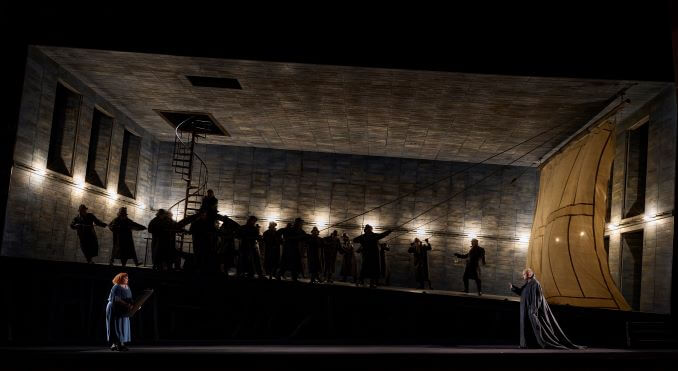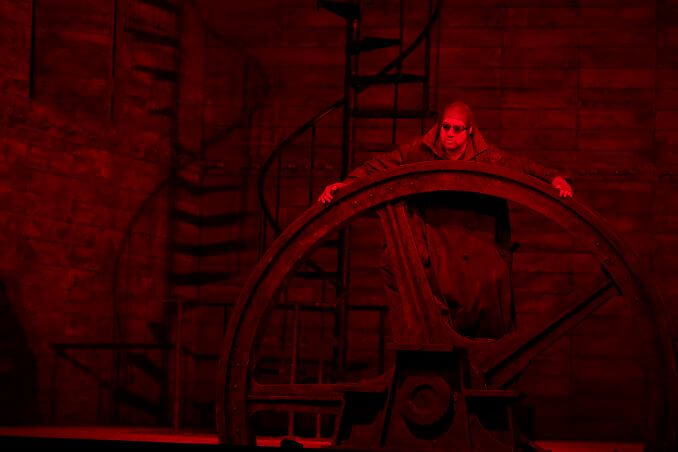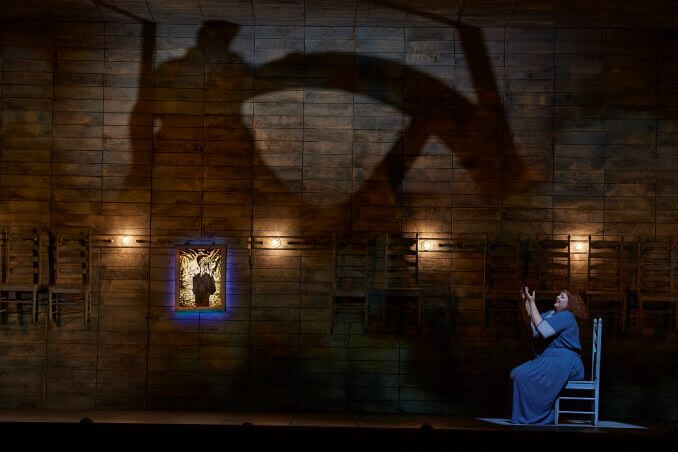It may not entirely look the part, but Richard Wagner’s The Flying Dutchman (1843) is very much a ghost story. It is also, in Wagner’s original text, a love story, albeit a story of intense love, prefiguring Wagner’s later works of “love death” including Tristan und Isolde (1865) and Götterdämmerung (1876). That Christopher Alden’s production of Dutchman – remounted at the Canadian Opera Company for the first time since 2010 – sometimes fails to convey these themes does not necessarily make it a lesser production. It does, however, reflect the risks inherent when a classic work is reimagined by a modern director who chooses to ignore at least some of its creator’s intentions. The COC’s Dutchman is, at times, breathtaking. But it is not entirely what Wagner would have wanted.

The best part of Dutchman is Wagner’s eternal music. From the opening strains of that familiar overture, Dutchman sucks audiences right in and doesn’t let go for its entire two-and-a-half-hour duration. (Wagner originally wrote it to run with no intermission, but the COC’s production includes a welcome break at the ninety-minute mark.) The COC orchestra is a rock-solid opera orchestra, and under the steady baton of Music Director Johannes Debus has consistently demonstrated the strength, skill, and nuance required for performances of Wagner, including during the COC’s acclaimed 2006 run of the Ring Cycle.
The second best part of the COC’s particular version of Dutchman is the production design. The action takes place on an elevated stage set at an angle, as if the entire opera takes place on a ship during rocky weather. “Below stage”, so to speak, we see a sort of cutaway of the ship’s interior, all wooden beams and creaky mechanical parts. Occasionally, we even catch glimpses of the ghosts that haunt the ship, peering out from the darkness. And while most of the costume design is fairly dull, I do love the third act “party” costumes adorning the female choristers, who wear a sort of ectoplasm green that glows under the stage lights.
Dutchman‘s cast does a formidable job with the opera’s musically and dramatically complex characters. Danish baritone Johan Reuter, who will be making his way to the Paris Opéra later this year for a new production of Wagner’s Lohengrin, is wonderful as the title character, managing to portray him as hard-willed and terrifying, yet also weak, almost tender, clearly suffering the effects of a long-running curse. Soprano Marjorie Owens is very good as Senta, the young woman in love with the idea of the Dutchman even before she first encounters him. Unfortunately, Alden’s production has cursed her with some incredibly tacky clown-like makeup that inadvertently makes her look like one of the Dutchman’s ghostly shipmates. Franz-Josef Selig as Senta’s father Daland, Miles Mykkanen as The Steersman, one of several characters in love with Senta, and Christopher Ventris as her would-be betrothed Erik round out an excellent cast.

The “Dutchman” also refers, of course, to Der fliegende Holländer, “The Flying Dutchman”, the ship itself. Manned by a “crew of the dead”, the Dutchman is the physical manifestation of a curse, a ship that mysteriously appears once every seven years, usually as a portent of doom. You probably know the Dutchman from the Pirates of the Caribbean movies; in this production it remains mostly unseen, though we do occasionally catch glimpses of its skeletal crew, lurking beneath the impressively built lopsided stage.

In reimagining the Dutchman as this genuinely horrifying figure, the COC transforms Senta’s love into something darker and stranger – pure obsession, beyond all reason. Plenty of operas feature characters who fall in love with a portrait or an ideal of a person, but where Wagner clearly sought to portray Senta’s love as genuine, if obsessive, Alden’s direction removes the possibility that any real love could ever pass between her and the Dutchman.
Combined with Alden’s ill-advised decision to rewrite Wagner’s original ending – the transcendent music remains, but key moments have been removed or drastically overhauled – you’re left with the unfortunate feeling that characters – Senta, in particular – have been robbed of the agency Wagner intended for them. It’s an unfortunate note to end on, in an otherwise entertaining, at times thrilling production.
*
Tickets for the COC’s The Flying Dutchman are available here.



